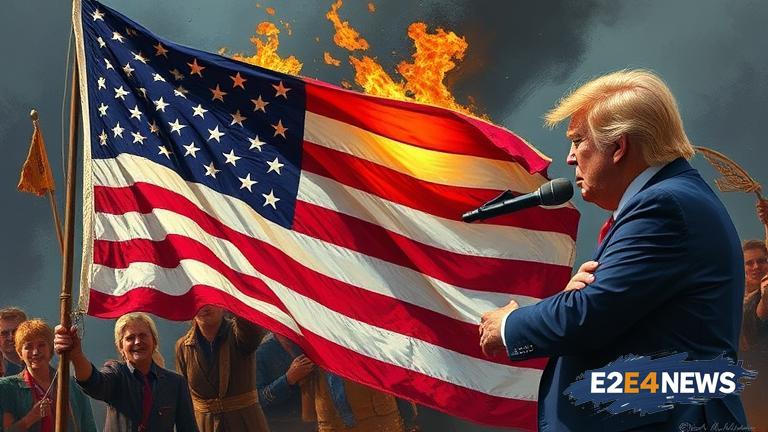The United States has recently witnessed a significant development in its legal landscape, as President Donald Trump has introduced a new law that criminalizes the burning of the American flag. This move has sparked intense debate and concern among citizens, with many arguing that it infringes upon their right to free speech. The law, which imposes a one-year jail sentence on those found guilty of desecrating the flag, has been met with widespread criticism from civil liberties groups and legal experts. They argue that the law is a clear violation of the First Amendment, which guarantees the right to freedom of expression. The American Civil Liberties Union (ACLU) has been vocal in its opposition to the law, stating that it is a blatant attempt to suppress dissent and stifle free speech. The organization has vowed to challenge the law in court, citing the landmark Supreme Court case of Texas v. Johnson, which ruled that flag burning is a form of protected speech. Many have expressed concerns that the law will be used to target marginalized communities and silence political dissent. The law has also been criticized for its potential to chill free speech, as people may be reluctant to express their opinions or engage in protests for fear of being arrested and jailed. The international community has also weighed in on the issue, with many countries expressing concern over the erosion of free speech in the US. The United Nations has issued a statement calling on the US government to respect the rights of its citizens and to uphold the principles of freedom of expression. The law has also sparked a heated debate over the role of the government in regulating speech and the limits of free expression. While some argue that the law is necessary to protect the dignity and honor of the flag, others contend that it is a form of censorship that undermines the very principles of democracy. The issue has also highlighted the deep divisions within American society, with many people taking to social media to express their opinions on the matter. Some have argued that the law is a distraction from more pressing issues, such as economic inequality and social justice. Others have seen it as a cynical attempt to rally support among conservative voters. The law has also raised questions about the limits of presidential power and the ability of the executive branch to unilaterally impose laws that restrict individual freedoms. As the debate continues to rage, it remains to be seen how the law will be enforced and what impact it will have on free speech in the US. The ACLU and other civil liberties groups have vowed to continue fighting against the law, and it is likely that the issue will end up in the Supreme Court. The outcome of the case will have significant implications for the future of free speech in the US and will be closely watched by the international community. In the meantime, the law has already had a chilling effect on free speech, with many people hesitant to express their opinions or engage in protests for fear of being arrested and jailed. The law has also sparked a wave of protests and demonstrations across the US, with many people taking to the streets to express their opposition to the law. As the situation continues to unfold, it is clear that the issue of free speech and flag burning will remain a contentious and deeply divisive issue in American society.
